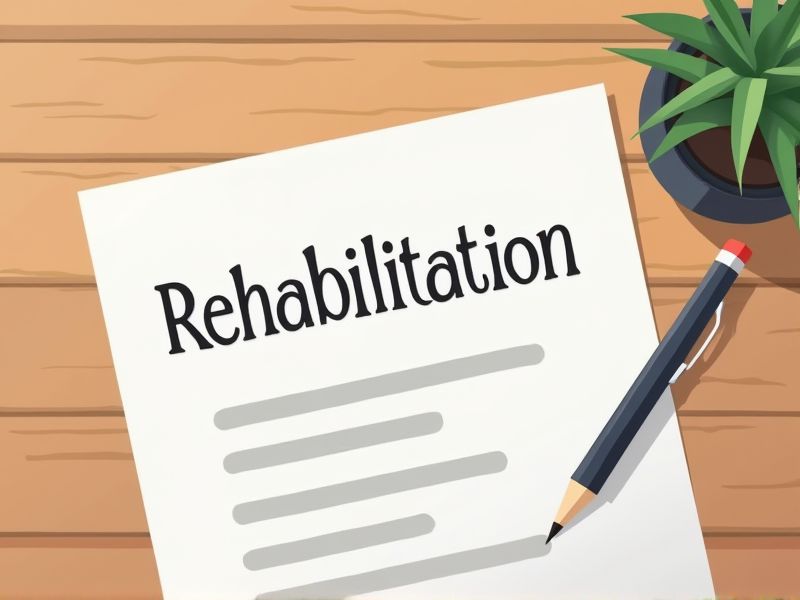
Rehabilitation counselors work with individuals facing physical, emotional, or mental challenges, and specialized knowledge is crucial to effectively support these clients. Certifications ensure counselors have the expertise in rehabilitation techniques and understand the ethical concerns involved. They validate one's skills and improve credibility among employers and clients. Important certifications for a rehabilitation counselor include Certified Rehabilitation Counselor (CRC) and Licensed Professional Counselor (LPC).
Certified Rehabilitation Counselor (CRC)
A Certified Rehabilitation Counselor (CRC) has specialized knowledge and skills that enhance the effectiveness of rehabilitation counseling, leading to better patient outcomes. CRCs are equipped to navigate complex cases involving physical, mental, and emotional disabilities, which directly impacts the recovery process. Certification provides a standardized measure of competence and professionalism that ensures consistent service quality across the board. Employers and clients often prefer certified professionals, perceiving them as more credible and trustworthy, which results in higher demand for their services.
Licensed Professional Counselor (LPC)
Rehabilitation counselors often deal with individuals overcoming physical, emotional, or mental disabilities, and an LPC enhances their ability to address emotional and psychological aspects. The LPC credential provides advanced training in therapeutic techniques crucial for holistic rehabilitation support. Many clients face complex emotional challenges during rehabilitation, necessitating expertise in mental health counseling that LPCs possess. LPCs can offer a broader range of counseling services tailored to individual needs, improving overall rehabilitation outcomes.
National Certified Counselor (NCC)
The National Certified Counselor (NCC) credential ensures that a rehabilitation counselor meets high professional standards and possesses necessary competencies. Without such certification, inconsistent skills could affect the quality of care for clients needing specialized rehabilitation support. The NCC certification fosters trust and confidence among clients and employers, increasing job opportunities and professional growth. Certified counselors stay updated on best practices through continuous education, which directly impacts their effectiveness in addressing diverse rehabilitation needs.
Certified Case Manager (CCM)
A Certified Case Manager (CCM) provides a standardized level of expertise that enhances the effectiveness of rehabilitation counseling. Holding a CCM certification signifies advanced knowledge in coordinating care, which is crucial for managing the complex needs of individuals in rehabilitation. The certification ensures proficiency in assessing patient needs, which directly impacts successful recovery outcomes. Employers value CCM certification as it assures adherence to best practices, contributing to improved healthcare delivery and patient satisfaction.
Certified Addictions Counselor (CAC)
Rehabilitation counselors often work with individuals facing substance use disorders, requiring the specialized knowledge that a Certified Addictions Counselor can provide. The CAC credential ensures that the counselor possesses the necessary expertise in addiction treatment strategies, enhancing the effectiveness of rehabilitation programs. Evidence-based practices derived from addiction counseling can significantly improve client recovery outcomes. Ethical and legal standards specific to addiction issues are better navigated by professionals with specialized certification, safeguarding both clients and the counseling practice.
Licensed Mental Health Counselor (LMHC)
Licensed Mental Health Counselors possess specialized training in addressing emotional and psychological issues, which can enhance the therapeutic interventions provided by Rehabilitation Counselors. A holistic approach in rehabilitation relies on understanding the mental health aspects intertwined with physical recovery, which LMHCs are equipped to manage. Collaboration between LMHCs and Rehabilitation Counselors can lead to more comprehensive care plans that address both mental health and rehabilitation goals. Complex cases involving mental health disorders benefit from the LMHC's expertise in diagnosis and treatment, ensuring more effective recovery outcomes.
Certified Disability Management Specialist (CDMS)
Certified Disability Management Specialist (CDMS) enhances the credibility of a rehabilitation counselor by ensuring they meet recognized standards in disability management. This certification signals a counselor's proficiency in designing effective workplace accommodations and return-to-work programs. It fosters trust among employers and clients by demonstrating expertise in navigating complex disability benefits and legal regulations. Rehabilitation counselors with CDMS certification can improve client outcomes through informed decision-making and tailored intervention strategies.
Certified Vocational Evaluation Specialist (CVES)
Certified Vocational Evaluation Specialists (CVES) provide an objective assessment of an individual's work skills, which aids rehabilitation counselors in crafting personalized rehabilitation plans. Their expertise ensures that clients' capabilities align with potential employment opportunities, enhancing job placement success rates. CVES certification signifies adherence to industry standards, boosting trust in the evaluation process among clients and employers. The specialized knowledge of a CVES supports the rehabilitation counselor in developing effective strategies to achieve optimal rehabilitation outcomes.
Certified Peer Support Specialist (CPSS)
Certified Peer Support Specialists (CPSS) bring personal experience of recovery that can foster trust and rapport with clients, often resulting in more effective therapeutic relationships. Their presence in rehabilitation settings can lead to improved client engagement, which often increases the likelihood of achieving recovery goals. CPSS offer insights that complement the clinical perspectives of rehabilitation counselors, often providing a more holistic approach to mental health care. This collaboration can enhance program outcomes, aligning with evidence suggesting that peer support services can reduce hospitalization rates and improve long-term recovery trajectories.
Certified Return-to-Work Coordinator (CRWC)
The presence of a Certified Return-to-Work Coordinator (CRWC) significantly enhances the ability of rehabilitation counselors to develop effective, individualized plans for injured workers. By integrating expertise in workplace accommodations and injury management, a CRWC ensures a smoother transition back into the workforce, thus reducing downtime and potential costs for employers. With specialized training, a CRWC effectively bridges communication between healthcare providers, employers, and the injured party, fostering better outcomes for all stakeholders. The structured approach of a CRWC minimizes the risk of re-injury and promotes sustained productivity, aligning with best practices in vocational rehabilitation.
Summary
You can expect enhanced career opportunities when you pursue certifications as a Rehabilitation Counselor, as these credentials demonstrate specialized expertise. Earning certifications can boost your confidence in guiding clients through vocational and personal challenges. Many employers prefer or even require certified counselors, potentially increasing your job prospects and salary. This recognition can also expand your professional network, connecting you to a broader community in the rehabilitation field.
